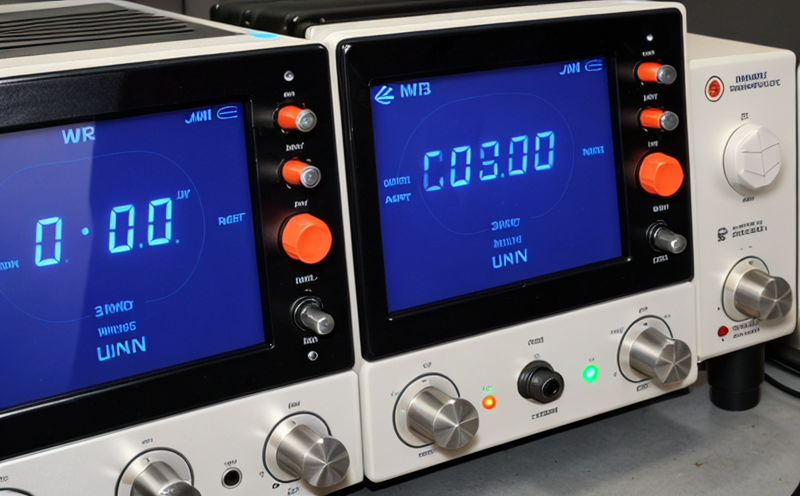IEC 62104 Low Power RF Transmitter Compliance Testing
The IEC 62104 standard is a cornerstone in the realm of low-power wireless communication systems. This standard ensures that devices comply with stringent requirements for power consumption, interference minimization, and operational reliability within the 30 kHz to 500 MHz frequency range.
Low-power RF transmitters are indispensable components in smart home and IoT ecosystems. They enable seamless data exchange between devices, enhancing functionality and efficiency without compromising on energy efficiency or signal quality. The IEC 62104 standard plays a critical role by providing a framework for manufacturers to design, test, and validate their products before market release.
The testing process involves several key stages aimed at ensuring compliance with the specified parameters:
- Power Consumption Measurement: Ensuring that devices operate within the maximum allowed power limits.
- Interference Testing: Verifying that transmitters do not cause harmful interference to other devices operating in the same frequency band.
- Emissions and Immunity Testing: Assessing the transmitter’s emissions against international standards to prevent signal distortion or noise in the environment.
- Environmental Stress Tests: Evaluating how well the device performs under various environmental conditions such as temperature, humidity, and altitude.
The importance of these tests cannot be overstated. Non-compliance can lead to product recalls, regulatory penalties, and damaged brand reputation. Furthermore, failure in compliance testing may result in interoperability issues with other devices within the same network or ecosystem, leading to user dissatisfaction and potential financial losses.
Our laboratory utilizes advanced test equipment such as spectrum analyzers, power meters, and interference analyzers to conduct these tests. The precision of our instrumentation ensures accurate results that meet international standards like IEC 62104-1, -2, and -3. Our team of experts provides detailed reports and recommendations for any necessary adjustments or improvements.
In summary, compliance testing under the IEC 62104 standard is essential for manufacturers to ensure their products are safe, reliable, and interoperable in a rapidly evolving smart home and IoT landscape. By adhering to these stringent requirements, companies can enhance user experience while meeting regulatory obligations.
To learn more about how we can assist your organization with IEC 62104 compliance testing, please contact us directly for a tailored quote and consultation.
Why It Matters
The importance of IEC 62104 low-power RF transmitter compliance cannot be overstated. In the era of smart homes and IoT devices, these transmitters form the backbone of communication networks. Their performance directly impacts the overall functionality and reliability of connected systems.
Compliance with IEC 62104 ensures that:
- Devices are energy-efficient, contributing to a greener environment.
- There is minimal interference between devices operating in the same frequency band, enhancing network performance and reducing signal distortion.
- Products meet international standards, facilitating global trade and market access.
For quality managers and compliance officers, ensuring IEC 62104 compliance is not just a regulatory requirement but also a strategic decision that can enhance brand reputation and customer satisfaction. For R&D engineers and procurement professionals, it provides the necessary insights to optimize product design and supply chain.
The stakes are high for non-compliance. Regulatory fines, market withdrawals, and reputational damage can all result from failure in meeting these standards. By investing in thorough compliance testing, organizations can avoid these pitfalls and position themselves as leaders in innovation and reliability.
Applied Standards
The IEC 62104 family of standards is designed to provide comprehensive guidance for the design, development, and compliance testing of low-power RF transmitters. These standards cover various aspects including:
- IEC 62104-1: General requirements.
- IEC 62104-2: Test procedures for emissions and immunity.
- IEC 62104-3: Test procedures for power consumption.
The standards are continuously updated to reflect the latest technological advancements and regulatory trends. Our laboratory keeps abreast of these changes, ensuring that our testing protocols remain current and aligned with international best practices.
Our compliance testing services encompass both individual components and complete systems, providing a holistic approach to ensure full compliance across all relevant aspects. This comprehensive coverage ensures that your products not only meet the basic requirements but also perform optimally in real-world applications.
Use Cases and Application Examples
- Smart Home Devices: Transmitters used in smart thermostats, security systems, and lighting controls. These devices must ensure minimal interference with other appliances while maintaining reliable communication.
- Wearable Technology: Fitness trackers and smartwatches rely on low-power RF transmitters to send data securely to smartphones or servers. Compliance testing ensures secure and efficient transmission of health metrics.
- Wireless Sensors: These are deployed in various environments such as industrial settings, agriculture, and environmental monitoring. They need to operate reliably without causing harmful interference to other devices.
- IoT Gateways: Acting as central hubs for data collection and distribution, these devices must comply with IEC 62104 standards to ensure seamless integration into larger IoT ecosystems.
In each of these applications, the ability of transmitters to operate efficiently within specified frequency bands while minimizing interference is crucial. Our testing services help manufacturers achieve this balance, ensuring that their products perform reliably and securely in diverse environments.





